While walking through the dim and narrow streets of downtown Pittsburgh, I sometimes think of Theodore Dreiser, author of Sister Carrie, Jennie Gerhardt, and An American Tragedy.
He lived in the area for a few years while working for the Pittsburg Dispatch.
When I look for signs of Dreiser in Pittsburgh, I’m looking for the Pittsburgh of 1892.
Look at that newspaper!
The first thing one notices is the spelling of Pittsburgh. Where’s the final h?
Already, in the name of the newspaper, I feel that I can’t recover Dreiser’s city.
But then I look at the phrases the newspaper uses to advertise itself: “Largest Paper in the State” . . . “Best Advertising Medium.”
Ah! a flicker of recognition!
These are bold phrases that Dreiser would use. His mind was dominated by the big and obvious. He felt that America was too much. Everything was too heavy. Everything was too bold and in-your-face. It’s the broad and obvious surfaces of America that appear in Dreiser’s novels. Even the introspective worlds of his characters are big and obvious surfaces. This is why readers of his novels acquire a foreboding that a world so big and obvious must crush us.
But what was Dreiser’s America? Was it as big and obvious as ours?
Look again at the Pittsburg Dispatch. It brags: “Circulation over 15,000!”
Then I look at a picture of Dreiser’s Pittsburgh of 1892.
In that 1892 picture, you can see the incline, the coal barges in the river, and the Smithfield Street Bridge. And then I realize more of Dreiser’s Pittsburgh is still here than I first thought.
Only we’re much bigger and even more obvious now.
* Orlando Bartro is the author of Toward Two Words, a comical & surreal novel about a man who finds yet another woman he never knew, usually available on Amazon for $4.91.









